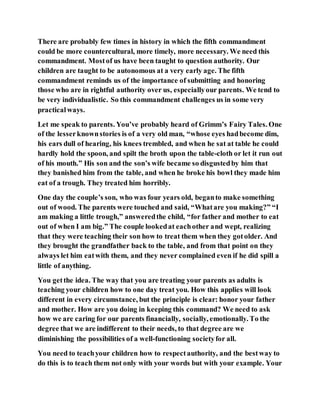The document discusses the significance of the fifth commandment, which instructs children to honor their parents. It emphasizes that this commandment not only establishes a moral duty but also reflects the divine relationship between God, parents, and children, portraying parents as representatives of God. The paper also highlights the responsibilities of parents in fulfilling this commandment and the consequential promise of prolonged life for children who honor their parents.
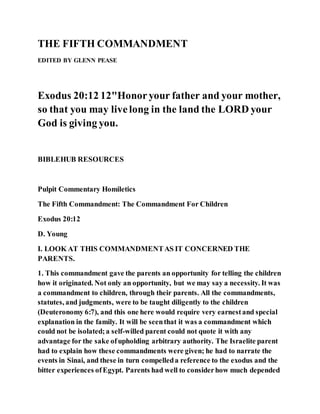




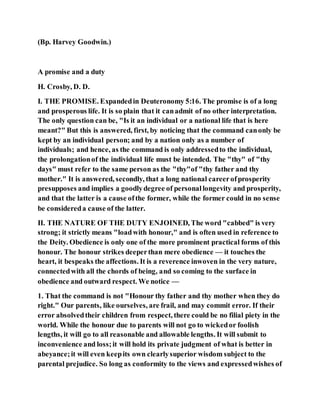









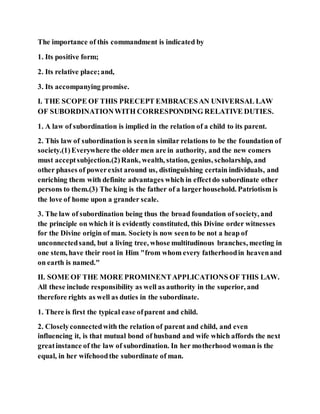



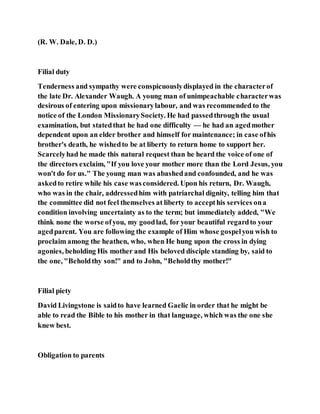

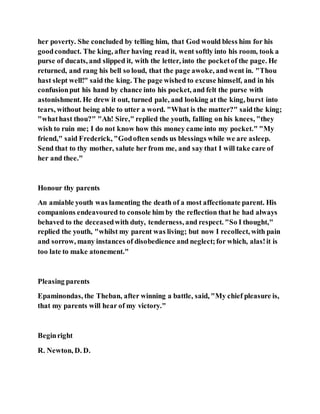
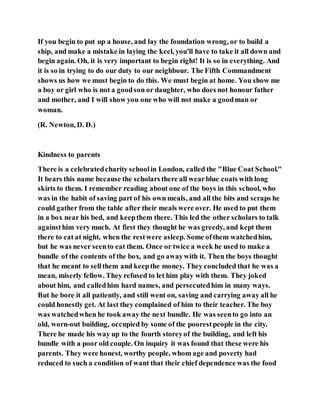
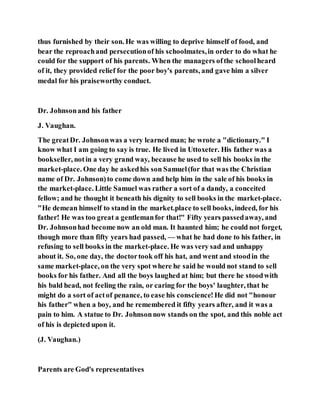




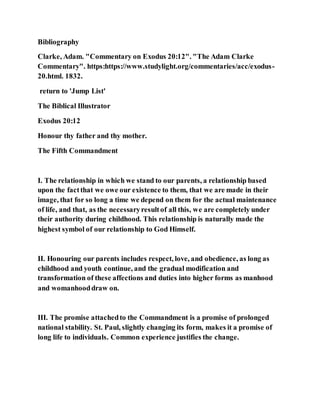
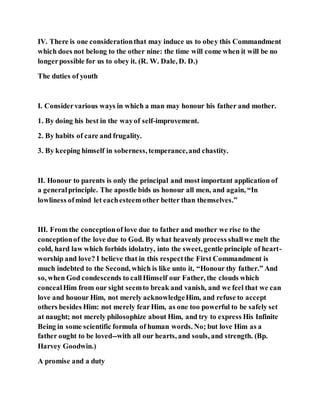



















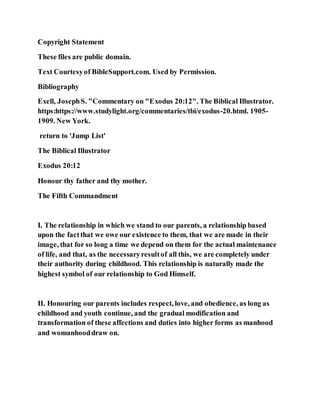

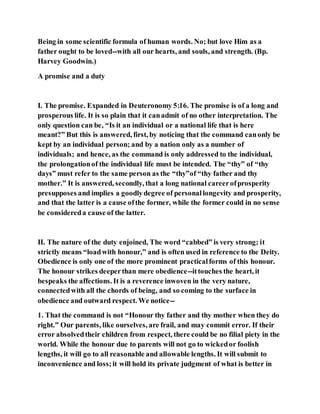


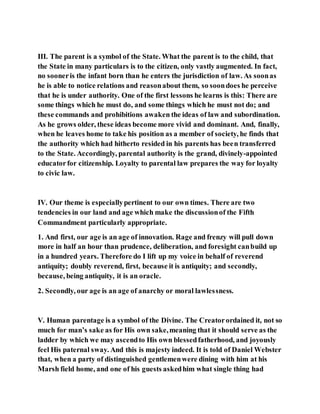
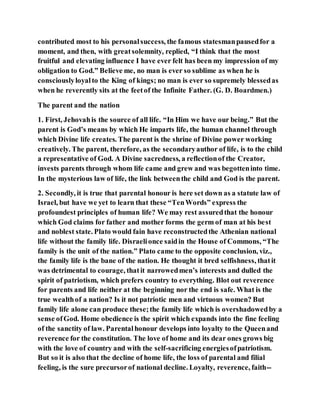









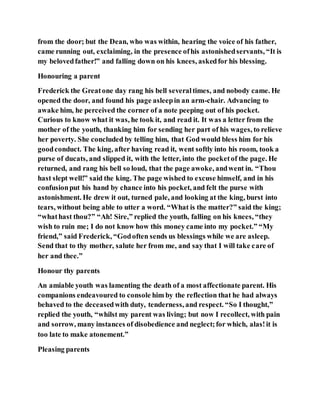

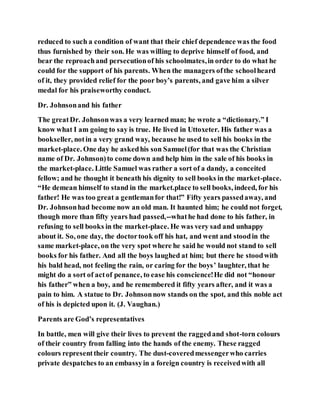


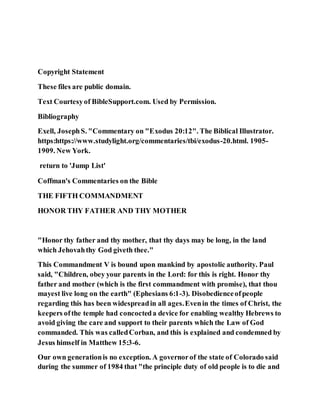
![get out of the way of the younger generation." This was widely publicized, nor
did the governoreven have the grace to make an exceptionof his own father
and mother. Certainly, that is a very common view in America at this stage of
history, and very regrettable. The youth of every generationsorelyneed the
wisdom and stability that only age can provide. Adolescentimpatience and
disrespectof the agedis both foolish and amusing. "If the race were
advancing as rapidly as eachnew generationof adolescents believes, mankind
would have long since passedthrough the gates ofperfection."[18]The
apparent gulf that separates some young people from their parents is merely a
youthful fantasy, due to pass awayin time, just like acne. Five things are
promised to those who obey and honor their parents: "These are:(1) grace in
the presentlife and glory in the life to come; (2) long life upon the earth; (3)
grateful and pleasing children; (4) a goodname; and (5) material wealth."[19]
This commandment protects the home. The home is the basic building block
of civilization. And if there is ever to be a better world, it must begin with
better homes. The home is the place where the young human must learn to
acceptand honor authority. And if he does not do so in the home, he becomes
a troublemaker in school, and soongraduates to the police court. The
beginning of all law and order lies right here in Commandment V.
Our very civilization today is under attack by all the forces of evil, and the
home is primarily the focus of that attack. The young should realize what they
have to lose if they join with the forces dedicatedits destruction.
"Thathome, with which they are inclined to be so impatient, is under stress
which never existedbefore. It is quite possible to explain to young people, so
that they gladly become a part of the crew in the little ship upon the stormy
sea, insteadof being merely passengers."[20]
The honoring of father and mother is the divine order, not merely for children
and young people, but for all people. Those PhariseeswhomJesus condemned
for their godless neglectofthis commandment, were in no sense "young
people," but the leaders of the Jewishnation (Matthew 15:5-6).
Let intelligent youth join hands with venerable age, and, together, it may be,
they shall be able to slay the dragonthat threatens to devour the world.](https://image.slidesharecdn.com/thefifthcommandment-190726222737/85/The-fifth-commandment-72-320.jpg)




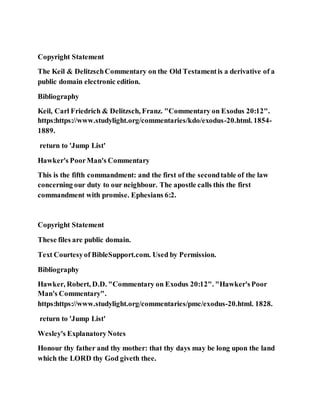

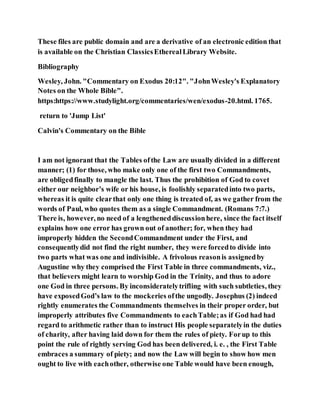




![greaterpart of men to pay submission to a few. Nay, since subjectionis
naturally disagreeable, many would have kickedagainstit. God, therefore,
propounds a specific kind of subjection, which it would have been gross
barbarism to refuse, that thus, their ferocity being gradually subdued, He
might accustommen to bear the yoke. Hence the exhortations are derived,
that people should “honor the king;” that “everysoul should be subject unto
the higher powers;” that “servants should obey their masters, even the
froward and morose.” (Proverbs 24:21;1 Peter2:13; Romans 13:1; Ephesians
6:5; 1 Peter2:14.)
The Fr. concludes the sentence thus: “et ainsi nous sont comme maistresses
pour nous apprendre a recognoistrele bien que nous avons receude ceux qui
nous ont mis au monde et elevez;” and so are, as it were, our mistresses to
teachus to repay the benefits of those who have brought us into the world and
reared us.
; fu~nai ejpicqoni>oisin a]riston,
Mhd j ejsidei~n aujgavojxe>ov hjeli>v.
Fu>nta d j o[pwv w]kiva pu>lav aji`>daw perh~sai
Kai< kei+sqaipollh<n gh~n ejpamhsa>menon. —
425-428.
It is also reported by Plutarch, in his Παραμυθητικὸς προς Απολλώνιον, by
whom, as well as by Cicero, it is called the reply of Silenus to Midas, —
“Affertur etiam de Sileno fabella quaedam: qui cum a Mida captus esset, hoc
ei muneris pro sua missione dedisse scribitur: docuisse regem, non nasci
homini longe optimum esse;proximum autem, quamprimum mori.” — Tusc
Quaest. 1:48. “Ex quo intelligi licet, non nascilonge optimum esse, nec in hos
scopulos incidere vitae; proximum autem, si natus sis, quamprimum mori, et
tanquam ex incendio effugere fortunae. Sileni quae fertur fabula, etc.” —
Consolatio. Lactantius refers to the latter passage,De falsa sapientia, Section
19. “Hinc nata est inepta illa sententia, etc.”](https://image.slidesharecdn.com/thefifthcommandment-190726222737/85/The-fifth-commandment-84-320.jpg)



![return to 'Jump List'
John Trapp Complete Commentary
Exodus 20:12 Honour thy father and thy mother: that thy days may be long
upon the land which the LORD thy God giveth thee.
Ver. 12. Honour thy father, &c.]Philo well! observeth, that this fifth
commandment, which therefore he maketh a branch of the first table, and so
divides the tables equally, is a mixed commandment, εντολη μικτη;and
differs somewhatfrom the restof those in the secondtable. They consider
man as our neighbour, in nature like us: this, as God’s deputy, by him setover
us, and in his name, and by his authority, performing offices about us.
That thy days may be long.] A goodchild lengtheneth his father’s days;
therefore God promiseth to lengthen his. Ill children, as they bring their
parents’ "grayhairs with sorrow to the grave";so they are many times cut off
in the midst of their days, as Abimelech was:God rendering upon him the evil
that he did to his father. [ 9:56] Besides the punishment they have in their
posterity, to whom they have been peremptores potius quam parentes. (a) One
complained, that never father had so undutiful a child as he had: yes, saidhis
son, with less grace than truth, my grandfather had. {See Trapp (for summary
of Law) on "Exodus 20:17"}
Copyright Statement
These files are public domain.
Text Courtesyof BibleSupport.com. Used by Permission.
Bibliography](https://image.slidesharecdn.com/thefifthcommandment-190726222737/85/The-fifth-commandment-88-320.jpg)

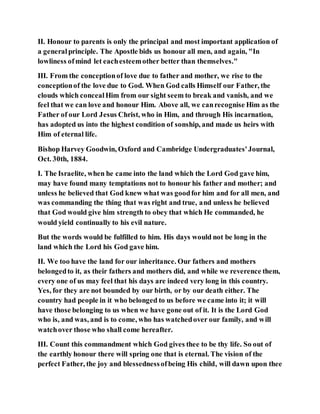

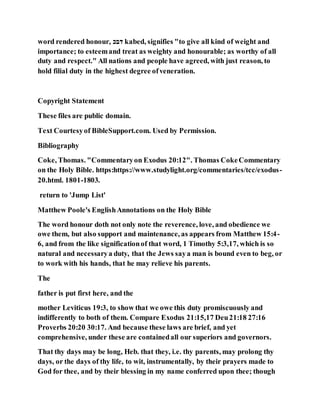
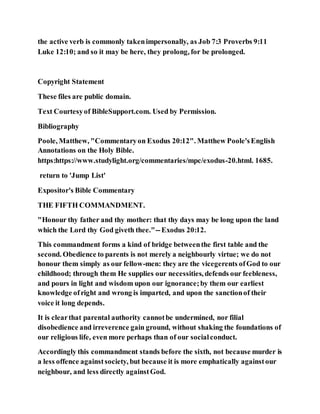



![steady maintenance of the patria potestas. (Maine, Ancient Law.) China has
mainly owedher long duration to the simple way in which she has uniformly
acknowledgedthe authority of her fathers.”
Copyright Statement
These files are public domain.
Text Courtesyof BibleSupport.com. Used by Permission.
Bibliography
Whedon, Daniel. "Commentary on Exodus 20:12". "Whedon's Commentary
on the Bible". https:https://www.studylight.org/commentaries/whe/exodus-
20.html. 1874-1909.
return to 'Jump List'
Expository Notes ofDr. Thomas Constable
The fifth commandment20:12
"The first four commandments set forth the principles guiding Israel"s
relationship to Yahweh; and the last six commandments set forth the
principles guiding Israel"s relationshipwith the covenantcommunity, and
more broadly, with the human family. As the second, third, and fourth
commandments are in many ways extensions of the first commandment, the
first four commandments are the foundation for the final six commandments.
And all of the commandments, as principles governing covenant relationships,
are founded on the ultimate OT statement of relationship, which stands as
prologue to the ten commandments: "I am Yahweh, your God" ... Because
Yahweh Isaiah, and is Israel"s God, Israelboth is and must become a certain
and specialpeople." [Note:Durham, p290.]](https://image.slidesharecdn.com/thefifthcommandment-190726222737/85/The-fifth-commandment-97-320.jpg)
![All Israelites were to honor their parents because parents are God"s
representatives to their children in God"s administrative order. Thus the fifth
commandment is as foundational to commandments six through ten as the
first commandment is to commandments two through four. The Israelites
were to honor God because He had given them life, and they were to honor
their parents because they were His instruments in giving them life. The
promise of long life in the Promised Land is a reminder that God gave the
command to Israelites. The Apostle Paul repeatedthis responsibility as
binding on the church in Ephesians 6:1-3 but changedthe command to
"obey," as well as the promise (cf. Matthew 15:3-4;Colossians3:20). [Note:
See Maurice E. Wagner, "How to Honor Your Parents When They"ve Hurt
You," PsychologyforLiving28:6 (June1986):12-14.]
Copyright Statement
These files are public domain.
Text Courtesyof BibleSupport.com. Used by Permission.
Bibliography
Constable, Thomas. DD. "Commentaryon Exodus 20:12". "ExpositoryNotes
of Dr. Thomas Constable".
https:https://www.studylight.org/commentaries/dcc/exodus-20.html. 2012.
return to 'Jump List'
JosephBenson's Commentaryof the Old and New Testaments
Exodus 20:12. We have here the laws of the secondtable, as they are
commonly called, the last six commandments, which concernour duty to
ourselves and one another, and are a comment upon the secondgreat
commandment, Thou shalt love thy neighbour as thyself. As religion toward
God is an essentialbranch of universal righteousness,so righteousnesstoward](https://image.slidesharecdn.com/thefifthcommandment-190726222737/85/The-fifth-commandment-98-320.jpg)






![21:15,17;Leviticus 19:3,32;1 Kings 2:19; 2 Kings 2:12; Proverbs 1:8,9; 15:5;
20:20;Proverbs 23:22-25;28:24; 30:11,17;Malachi1:6; Matthew 15:4-6;
Luke 18:20; Ephesians 5:21;6:1-3; Colossians 3:20
that thy
Deuteronomy 4:26,40;25:15; 32:47;Proverbs 3:16
Copyright Statement
These files are public domain.
Text Courtesyof BibleSupport.com. Used by Permission.
Bibliography
Torrey, R. A. "Commentary on Exodus 20:12". "The Treasuryof Scripture
Knowledge". https:https://www.studylight.org/commentaries/tsk/exodus-
20.html.
return to 'Jump List'
Preacher's Complete HomileticalCommentary
CRITICAL NOTES.—
Exo . Upon the land.] More exactly: "upon the ground" or "soil" ('adhamah,
not 'eretz); a term happily used of a people destined to become a nation of
agriculturists. Patriotism clings fondly to the "soil" onwhich a people's
fathers have trod.
MAIN HOMILETICS OF THE PARAGRAPH.—Exo
THE FIFTH COMMANDMENT
I. Who are we to honour? "Thy father and thy mother." They have given
birth to their children. They have educated them. They have provided for
their wants in days of infancy and weakness. Theylove them as no one else
can. They watch them with intense interest, in the opening of their minds to
truth, and in their progress in socialand commerciallife. They are over them](https://image.slidesharecdn.com/thefifthcommandment-190726222737/85/The-fifth-commandment-105-320.jpg)






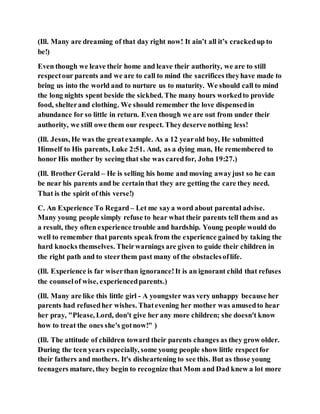











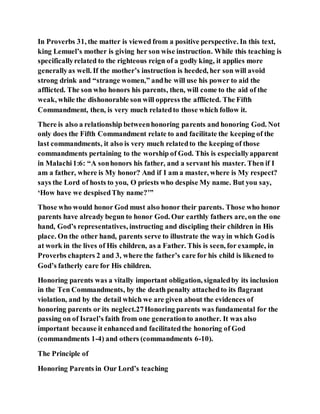



![and farms, along with persecutions;and in the world to come, eternallife. But
many who are first, will be last; and the last, first” (Mark 10:28-31).
“If anyone comes to Me, and does not hate his own father and mother and
wife and children and brothers and sisters, yes, and even his own life, he
cannot be My disciple” (Luke 14:26).
No earthly relationship can have higher priority than that of one’s
relationship with God. Putting God first means putting Him aheadof family.
The Practice ofOur
Lord of Honoring His Parents
Our Lord’s practice with respectto honoring parents serves as a commentary
on His teaching.
And when He became twelve, they went up there [to Jerusalem]according to
the customof the Feast;and as they were returning, after spending the full
number of days, the boy Jesus stayedbehind in Jerusalem. And His parents
were unaware of it, but supposedHim to be in the caravan, and went a day’s
journey; and they beganlooking for Him among their relatives and
acquaintances. And when they did not find Him, they returned to Jerusalem,
looking for Him. And it came about that after three days they found Him in
the temple, sitting in the midst of the teachers, both listening to them, and
asking them questions. And all who heard Him were amazed at His
understanding and His answers. And when they saw Him, they were
astonished;and His mother said to Him, “Son, why have You treated us this
way? Behold, Your father and I have been anxiously looking for You.” And
He said to them, “Why is it that you were looking for Me? Did you not know
that I had to be in My Father’s house?” And they did not understand this
statementwhich He had made to them. And He went down with them, and
came to Nazareth; and He continued in subjection to them; and His mother
treasuredall these things in her heart (Luke 2:42-51).
I must say that as a parent my first inclination is to identify with the
frustration and distress of Mary and Joseph, a frustration which is evident in
the text. At first glance, it does look as if it were Jesus who was wrong. Had](https://image.slidesharecdn.com/thefifthcommandment-190726222737/85/The-fifth-commandment-128-320.jpg)
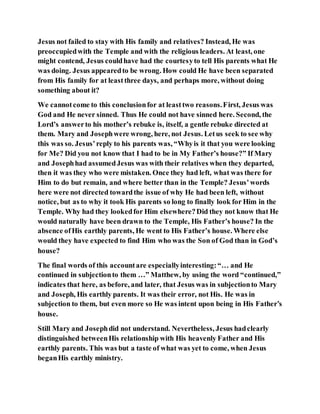





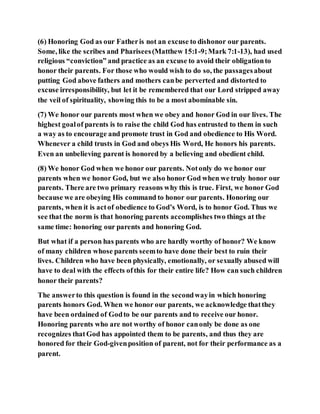











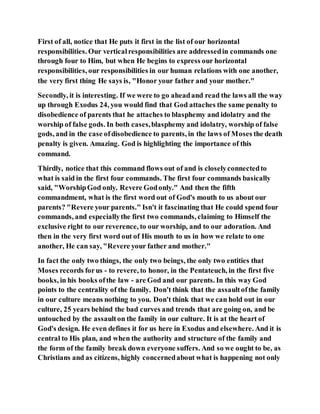




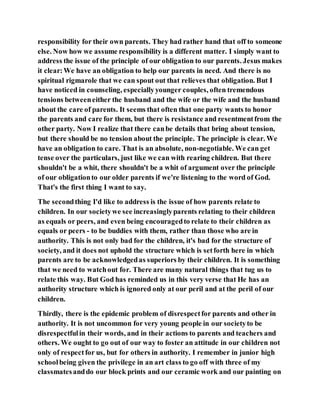

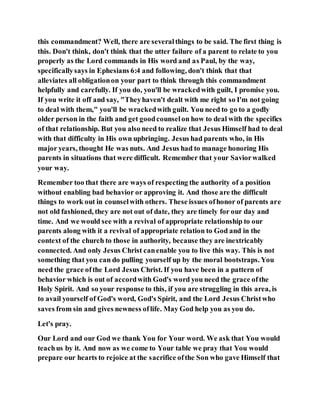
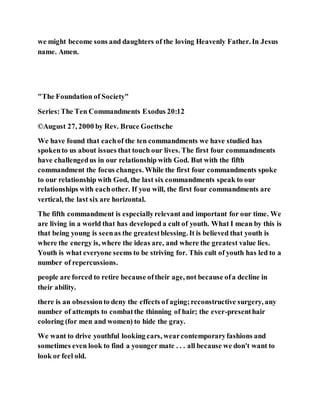
![Many older people are "dumped" in Nursing homes (which are not bad in
and of themselves)where they are forgottenby their friends and family. Many
people in a Nursing home are never visited by family.
there are increasing reports of "doctorassistedsuicide" (and who knows how
many unreported cases). This is when it is determined that you are too old to
be "useful" and so the suggestionis made that you could always "end your
life".
The elderly are increasinglythe targetof scams, violent crimes, and are often
treated as if their opinions don't matter.
When you reacha certain age (and it changes with the situation) your
opinions no longerseemto matter and you are treated as more of a bother
than person of value.
How different is the Biblical approachto aging. The Bible tells us to honor
those who older and to value the wisdom that comes with the years.. And this
is why the fifth commandment speaks with such relevance. It is clear and to
the point,
Honor your father and your mother, so that you may live long in the land the
Lord your God is giving you. [Exodus 20:12]
I believe there are two basic principles we easilysee.
RESPECTFOR AUTHORITY IS THE FOUNDATION FOR SOCIETY
Readthe reasoning right after the commandment and you will see some of the
benefits promised: "so that you may live long in the land the Lord your God is
giving you." In Deuteronomy5 we see a secondlisting of the 10
commandments. And in verse 16 we are told that we should honor our father
and mother so we may live long and so it would go wellwith us in the land the
Lord is giving us.
The Lord is declaring that our future prosperity and health are anchoredin
the strength of our family relationships. If the relationship betweenparents
and children disintegrates the very fabric of societybegins to unravel. James
Boice reminds us why family values are important,](https://image.slidesharecdn.com/thefifthcommandment-190726222737/85/The-fifth-commandment-156-320.jpg)
![The dark backgroundof this commandment is to be found in the natural
human dislike for authority. That is why the family is so important in God's
economy. If children are not taught to respecttheir parents but allowedto get
awaywith disobeying and dishonoring them, later in life they will rebel
againstother valid forms of authority. If they disobey their parents, they will
disobey the laws of the state. If they do not respecttheir parents, they will not
respectteachers, those who possess unusualwisdom, electedofficials and
others. If they do not honor their parents, they will not honor God.
[Foundations p. 237]
This commandment is important for the health of our society. But it is
important to see that this command should not be narrowly interpreted. In
today's societywith so many fractured families parents could refer to
biologicalparents
adopted parents
step-parents
people who have a "parental influence". (Those who are more parents than
our realparents)
The commandment has relevance for all of these people. They are all parents
in one sense and they have been given a position of authority by God over our
lives. We are to respectand honor them all because of their position.
But what we may not see is that the commandment also extends to those who
are figurative parents,
Other kinds of "fathers" and "mothers" are included in the intent of the
commandment. Commentators have pointed out that there are political
fathers (those in secularpositions of authority), spiritual fathers (pastors and
other Christian ministers) and those who are calledfather by virtue of their
old age and experience. It means we should look up to those whom God has
placed overus and treat them with "honor, obedience and gratefulness."
[Boice, Foundations p. 237]](https://image.slidesharecdn.com/thefifthcommandment-190726222737/85/The-fifth-commandment-157-320.jpg)
![Respectforauthority (which is a prerequisite for order) starts in the home.
But the principle works outwardto all who are in a position of authority. The
idea can surely be extended to include officers of the law, teachers, coaches,
employers and surely others. Honoring authority is not popular today and
that may be the reasonwe are seeing the problems we are seeing . . . the
problems of violence, immorality, and recklessness.
HONORING PARENTS HAS MANY PRACTICAL EXPRESSIONS
The word for Honor in the Old Testamentis a word that means "to be heavy"
or "to add weight". In the Bible parents are given greatweight. Reformer
John Calvin wrote,
The sum of the commandment, therefore, will be, that we are to look up to
those whom the Lord has setover us, yielding them honor, gratitude, and
obedience. Hence it follows, that every thing in the way of contempt,
ingratitude, or disobedience, is forbidden. [Calvin, Institutes p. 421]
Calvin uses the words: "honor, gratitude and obedience. Let's look at these
ideas. Since we are to honor or "give weight" to our parents it means their
desires, their values and their wisdom should matter to us. To treat a parent
with honor it means first, that we speak ofthem in ways that are honoring.
Listen to what the Bible says,
Anyone who attacks his father or his mother must be put to death. [Ex. 21:15]
Anyone who curses his father or mother must be put to death. [Ex. 21:17]
If anyone curses his father or mother, he must be put to death. He has cursed
his father or his mother, and his blood will be on his own head. [Lev. 20:9]
There is really no place for the talk about our "old man" or "old lady".
Parents should be spokenof in positive terms rather than negative.
But honoring our parents is not just about what we say, it is also about what
we do. We honor our parents when we listen to them, when we treat them
with kindness, when we share their specialdays, and when we make a special
effort to show them love and consideration.](https://image.slidesharecdn.com/thefifthcommandment-190726222737/85/The-fifth-commandment-158-320.jpg)

![chocolate . . . God has given children parents to guide them in areas where
they need help.
Now I will grant that sometimes parents make mistakes. Sometimes they are
abusive. Sometimes they make unreasonable demands. And everyone must
realize that when parents ask children to do things that God tells them not to
do, the children are right in disobeying. Our first responsibility is to God!
Children do not have to obey parents when they ask them to do something
dishonest, illegal, or immoral. But most of the time, children are to obey their
parents simply because they are their parents.
One final way we honor our parents is to care for them when they are old.
Perhaps you've read the story "I'll Love You Forever." It's the story about
how a parent and child relationship. It tells about a parent holding their child
at the various difficult times of life and eachtime they sang, "I'll love you
forever, I'll love you for always. As Long as I'm living My baby You'll Be." As
the story progresses the roles eventually reverse. The old infirmed parent is
now being held by their child as the child sings "I'll love you forever, I'll love
you for always, as long as I'm living my mother you'll be.."
In 1 Timothy 5 we read,
Do not rebuke an older man harshly, but exhort him as if he were your father.
Treatyounger men as brothers, older women as mothers, and younger women
as sisters, with absolute purity. Give proper recognitionto those widows who
are really in need. But if a widow has children or grandchildren, these should
learn first of all to put their religioninto practice by caring for their own
family and so repaying their parents and grandparents, for this is pleasing to
God. If anyone does not provide for his relatives, and especiallyfor his
immediate family, he has denied the faith and is worse than an unbeliever. [1
Timothy 5:1-5]
We live in a world where the government has takenover many of the
responsibilities that used to be the role of the family. Too often relatives are
seenas a burden rather than a responsibility. Parents should be able to count
on their children for help when it is needed. Love and respectshould have
tangible effects. It is shameful that we children are indulging themselves while](https://image.slidesharecdn.com/thefifthcommandment-190726222737/85/The-fifth-commandment-160-320.jpg)
![their parents are barely getting by. As the parent sacrificedfor the child, the
child should be willing, if needed, to sacrifice for the parent.
QUESTIONS
First, some of you might ask, "how does my relationship to parents rank with
my relationship with my own family? The Bible seems clear, "a man shall
leave his father and mother and be joined to his wife, and the two shall
become one flesh." (Genesis 2)Marriage changes things. I also think when a
child moves out of the home things change. The child who marries has a first
responsibility to their spouse and family. The child must be allowedto be an
adult . . . however, this does not mean that the child is finished with their
parent. . . . tough line to walk!
Second, what if the mother, father or other authority has been unworthy.
Maybe they have been abusive, or perhaps they desertedthe family, or maybe
were never around when you needed them. How do you honor parents like
this? In these caseswe must show honor for what we can. They may still be
those who gave us life . . . we are to honor them as our biologicalparents. Or
we honor them for caring for us when they do.
if one's parents are Buddhists, or materialistic atheists, there are still ways of
treating them humanly, keeping in communication, at leastto the level of
talking about food, clothing, shelter, the world news, art, or music in some
measure to them. If one's parents are unbelievers, a believing child should
write letters, remember to send surprises for birthdays, and give as
imaginative and loving care as is within the means of the child. Private help,
given without the parents realizing it, must also be given. This is constant
intercession, faithful prayer for their eyes of understanding to be open. To
take a stand againstwrong teaching or even evil practices still means one's
parents should be treated as human beings. The door must be left open. [Edith
Schaeffer, LIFELINES p. 107]
CONCLUSIONS
One of the nice things about living in a community like this is that you have
the opportunity to see many examples of parents being honored](https://image.slidesharecdn.com/thefifthcommandment-190726222737/85/The-fifth-commandment-161-320.jpg)
















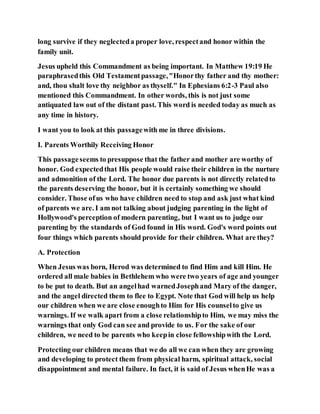













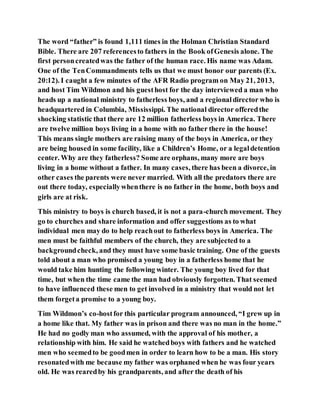










![Greeks. So the horse must be burned! But warnings faded by the
persuasivenessofits supporters. Additionally, the Greeks had planted Sinon,
one of their own, who deceived the leaders of Troy by explaining that the
woodenhorse was left behind to placate the angry Athene. Asked why so large
of a horse, Sinon replied, "To prevent you from bringing it into the city."
Once that happened, he continued, the people of Troy would be able to
conquer the Greeks.
They bought the lie. Bringing the horse into the city, the people of Troy
exhausted themselves in a night of revelry and celebration. Overcome by the
thought of new powerand freedom, they let down their guard and castcare to
the wind. Ignoring the warnings of accepting the gift of the Greeks leftthem
vulnerable to destruction from within. The Greeks conqueredTroy, reclaimed
Helen, and destroyedthe city. In the succeeding ages, the Trojan horse has
become a metaphor for self-deceitleading to destruction from within [The
Greek Myths, vol. II, 617-635].
A Trojan horse crept into our societyin the 1960s in the form of
a revolution calling for love and peace. Of course, the meaning of "love and
peace" hadnothing to do with love and peace!It had to do with overturning
authority at every level and removing all moral restraints. One of those
heavily involved in it described that period as "the generationthat destroyed
the American family." She explained the Trojan horse effect. "We might not
have been able to tear down the state, but the family was closer. We could get
our hands on it. And...we believed that the family was the foundation of the
state, as well as the collective state ofmind.... We truly believed that the family
had to be torn apart to free love, which alone could heal the damage done
when the atom was split to release energy. And the first step was to tear
ourselves free from our parents" [Annie Gottlieb, quoted by Philip Ryken,
Written in Stone, 117]. The leaders ofthis movement understood that to
overturn society, the family must be destroyed. Bit by bit, piece by piece, the
family erosioncontinues.
The authority structures in societysucceedor fail by what happens in
the home. Taking a look at the westernworld, we see that the home faces
constantbombardment from every angle. Yet, God calls us to honor Him](https://image.slidesharecdn.com/thefifthcommandment-190726222737/85/The-fifth-commandment-203-320.jpg)
![through honoring His design for the home as the basic building block for
society. How do we honor Godin the home?
I. Heavy life
We use the term "heavy" metaphorically in describing something that
is weighty or important or serious;something worth our undivided attention
and response. In this sense, we are to see the home as a heavy life. The Lord
calls for a sense of "heaviness"in the home, i.e., that we understand the
gravity of the relationships and responsibilities designedby the Creatorfor
the home. That's what is involved in the term "honor" and implied in this
commandment.
1. Basics
"Honor your father and your mother, that your days may be
prolonged in the land which the Lord your Godgives you." The Hebrew word
kavedcarries the basic meaning of "weighty" or "heavy." It's the same word
that is used over and over in the Old Testamentfor the glory of God, that is
"for the weightiness of his divine majesty" [Ryken 119]. How do we respond
to the glory of God? The Old Testamentpriests prostrated themselves before
God's glory. Elijah hid his face from the sight of God's glory. Isaiahcalled
down woes upon himself at the consciousnessofGod's holiness and glory. In
eachcase, the heaviness of the moment brought about a response that
acknowledgedthe unique authority of the Lord God over men.
While the honor given to parents is not comparable to that given to the
Lord, it is at leastrepresentedto us by degrees. To honor father and mother is
"to respect, esteem, value, and prize" them "as gifts from God" [Ryken 119].
They are not treated as God but rather as His gifts to the home.
The foundational relationship in the home is also spelledout for us in
this commandment: "honor your father and your mother." Specifically, both
father and mother, male and female, are needed to rightly lead and nurture
the home. Of course, the home is under regular attack by those declaring that
two men or two womenare just as capable to give the physical, mental,
emotional, and spiritual nurturing to children in the home as a husband and](https://image.slidesharecdn.com/thefifthcommandment-190726222737/85/The-fifth-commandment-204-320.jpg)

![to us. That doesn't mean that your parents speak without error; or that they
are always correctin their assessments oflife's situations. But it does mean
that in God's wisdom and providence in His designfor your life, He has
entrusted you to your parents so that they might be instruments for shaping
your characterand your future. I think Brian Edwards is correctwhen
speaking ofhow difficult things canbe at times with sinful parents and
children. "And it is just because the home is the hardest place to maintain
consistentrespectfor eachother that God places the markerthere. This value
and respect should begin in the home because that is the hardest place of all to
maintain it consistently" [The Ten Commandments for Today, 165]. Even
when parents are less than respectable, we are calledto honor them. We do
not have to be like them; but we can still honor them by the way we speak to
them, the way we listen to them, and the way we speak of them to others. As
we grow older, respectis found in the way we seek their counselin life's
important decisions and the appreciation we show them.
(2) Obedience
Since parents are the first line of instruction, honoring them calls for
obedience to their authority in the home. Paul put it, "Children, obey your
parents in the Lord, for this is right" (Eph. 6:1). Obedience recognizesGod-
given authority and submits to it "in the Lord" or for the Lord's sake. It's
interesting the way the mind works. Usually when this commandment is
presented, our first reactionis, "But what if my parents tell me to do
something that is wrong?" The exceptionto obedience towardparents is
topped only by our obedience to higher authority, namely, in this case, the
authority of the Lord and when in concertwith God's laws, the authority of
the state. Yet, how often do parents, even those that are pretty lousy at their
job, tell their children to do things that are wrong? I know that it happens,
but certainly not most of the time, and especiallyamong those that are
schooledin the Word of God, it should be the rare exceptionthat a child needs
to question the parents' command. So, honoring your parents implies your
obedience.
(3) Care](https://image.slidesharecdn.com/thefifthcommandment-190726222737/85/The-fifth-commandment-206-320.jpg)

!["I'm making a trough," he said, smiling up for approval, "to feed you and
Mamma out of when I get big."
The man and his wife lookedateachother for a while and didn't say
anything. Then they cried a little. Then they went to the cornerand took the
little old man by the arm and led him back to the table. They sat him in a
comfortable chair and gave him his food on a plate, and from then on nobody
ever scoldedwhen he clatteredor spilled or broke things [Smoke on the
Mountain, 60-61].
3. Honorable parents
This commandment also speaks to parents. It is not a club to wave over
a child's head, demanding his total submission. It is the Lord God that has
spoken, calling for obedience and honor toward parents, and with that, the
call for parents to be honorable. That begins by recognizing eachchild's
uniqueness as a gift from God. One of the common problems with many of the
parenting books is a "one-size-fits-all" approachto parenting. While there are
ample principles that we find in Scripture regarding our role as parents, we
must pay specialattention to the unique personality, gifts, deficiencies,
strengths and leanings of eachchild. The Amplified Bible's translation of
Proverbs 22:6 is helpful. "Trainup a child in the way he should go [and in
keeping with his individual gift or bent], and when he is old he will not depart
from it." It's not that we try to relive our desires through the child but that we
pay enough attention to see how God is uniquely working in that particular
child. Where does that child need to develop? How canwe, as parents, help to
shape the child's thinking, interests, and discipline? This may be the hardest
work that we face as parents. It involves interaction with our children and
often, the willingness to risk being misunderstood by them, and maybe even
our own parents, in order to give them the best direction for their lives.
Honorable parents do not attempt to be their child's best friend but
continue being his parent. Parents are the primary models for their children.
That involves modeling how to live the Christian life, faithfulness as husband
and wife, integrity and work ethic, teachability, servant-heartedness,and
respecting authority. It also means that parents must setthe example of](https://image.slidesharecdn.com/thefifthcommandment-190726222737/85/The-fifth-commandment-208-320.jpg)
![developing mind and heart, giving attention to improving thinking skills,
wrestling with the important issues of the day, standing upon the eternal
truths of the Word of God, and growing in relationships. "If we wish our
children to honor us," as Joy Davidman explained, "we must ourselves setthe
example of honor" [68].
II. Promising life
Paul calls the 5th commandment, "the first commandment with a
promise" (Eph. 6:2). He compressesboth the Exodus and Deuteronomy
statements. "Honoryour father and mother... so that it may be well with you,
and that you may live long on the earth."
1. Generalpromise
What is given is not an absolute that guarantees thatyou will live to be
in your nineties! Rather it is a generalpromise that affects you and the society
in which you live. Forthe Israelites just out of Egypt, God's promise, "that
your days may be prolonged in the land which the Lord your God gives you,"
spoke volumes. They did not have their own land, exceptthat which the Lord
had given to them. How long they would remain in the land would be affected
by the obedience and honor in their homes. The way of blessing is the wayof
obedience;that's what Israelneeded to understand as they prepared for the
new land. And that is still true for us.
Perhaps we see this best in the Proverbs as we have the wise father
giving counselto his son. "My son, do not forgetmy teaching, but let your
heart keepmy commandments; for length of days and years of life and peace
they will add to you" (3:1-2). This passageillustrates whatis found
throughout the Proverbs, that listening to and applying the wisdom of your
parents will have an affecton the duration and quality of your life. Walking in
the wayof deceivers oradulterers or thieves or partnering with the foolish
lead to broken lives, and often to death. The way of wisdom is always the way
of righteousness that affects everyaspectof your life.
2. No trivial issue](https://image.slidesharecdn.com/thefifthcommandment-190726222737/85/The-fifth-commandment-209-320.jpg)
![Honoring parents was never considereda small thing in ancient Israel.
The Old Testamentgives its sternestwarnings for children that disregard
their parents and choose to go their own ways. As Brian Edwards explained,
"With all the concernwe have today, and rightly so, about child abuse, we are
in danger of forgetting that God's first concernwas for the abuse of parents
by children" [167]. The civil law in Israel remedied the problem. "He who
strikes his father or his mother shall surely be put to death" (Ex. 21:15). "He
who curses his father or his mother shall surely be put to death" (Ex. 21:17).
"If there is anyone who curses his father or his mother, he shall surely be put
to death; he has cursedhis father or his mother, his bloodguiltiness is upon
him" (Lev. 20:9). "If any man has a stubborn and rebellious son who will not
obey his father or his mother, and when they chastise him, he will not even
listen to them, then his father and mother shall seize him, and bring him out
to the elders of his city at the gatewayof his hometown. They shall sayto the
elders of his city, 'This sonof ours is stubborn and rebellious, he will not obey
us, he is a glutton and a drunkard.' Then all the men of his city shall stone him
to death; so you shall remove the evil from your midst, and all Israelwill hear
of it and fear" [Deut. 21:18-21). Notice that the son's disobedience affectednot
only the family but the entire community, so that all are involved in removing
him. Though we don't have any New Testamentprecedentfor carrying out
this kind of sobering discipline, we do understand by this that God considers a
child's treatment of his parents as no trivial matter.
The New Testamentfurthers this by showing that disobedience in the
home is a sure sign of society's depravity. The downward spiral of
degenerationpainted in Romans one includes those who are "slanderers,
haters of God, insolent, arrogant, boastful, inventors of evil, disobedient to
parents" (Rom. 1:30). Paul warned that in the last times "men will
be...disobedientto parents" (2 Tim. 3:2). Jesus reservedsome of His strongest
rebukes to the religious leaders of Israelthat neglectedhonoring father and
mother by cleverclaims of spirituality. He called them hypocrites that honor
God with their lips but "their heart is far awayfrom Me" (Matt. 15:1-9). In
all of Scripture, honoring your father and your mother is always weighty to
God who establishedthis authority in the home.
III. Authority is a goodword](https://image.slidesharecdn.com/thefifthcommandment-190726222737/85/The-fifth-commandment-210-320.jpg)
![Honor and authority do not stop with the home. It begins there in the
earliestyears, but it spreads out into all of society. Students of Scripture,
confessions, catechisms,and commentators through the centuries agree that
the 5th commandment serves as the foundation for understanding the right
place of God-given authority in every realm of life, whether home, church,
school, work, orstate. That's why the implications of the 5th commandment
remain essentialto the entire framework of our lives.
1. Structures of authority
God has so createdus and so ordered humanity that we must recognize
authority or fall prey to ourselves and the sinful world about us. Anarchy is
bound up in the human heart so that we find ourselves balking at submitting
our wills to law in the home or community. God-givenauthority restrains evil.
It maintains civility and promotes proper freedom. Yet the native inclinations
of the heart resistand argue with submitting to anyone. Ultimately, that's why
it is only as our hearts are subdued by Jesus Christthe Lord that we find
freedom in properly responding to authority. As we are crucified with Christ,
our sinful desires dying with Him, and the reins of our hearts given overto
Christ as Lord, then we find an incredible freedom within God-given
authority.
Tedd Tripp has captured the right aim for parental authority in the
home in Shepherding a Child's Heart. The title of his excellentbook
summarizes what parents must seek to do: "You exercise authority as God's
agent. You may not direct your children for your own agenda or convenience.
You must direct your children in God's behalf for their good....Thepurpose
for your authority in the lives of your children is not to hold them under your
power, but to empowerthem to be self-controlledpeople living freely under
the authority of God" [13-14].
Even in a Roman world ruled by godless men, Paul and Petercalled
upon Christians and all men "to be in subjection to the governing authorities.
For there is no authority exceptfrom God, and those which exist are
establishedby God" (Rom. 13:1; 1 Pet. 2:13-17). Yet if one does not bend his
will to parental authority in the home, it is not likely that he will do the same](https://image.slidesharecdn.com/thefifthcommandment-190726222737/85/The-fifth-commandment-211-320.jpg)
























![would be foolishto shrug off your parents’ counselwithout careful
consideration. There are times as a Christian young personwhen you must
follow God’s leading, for example, to go to the mission field, even though your
parents (who may even be believers) don’t want you to go. In order to obey
God by going to seminary, and later moving to Europe to serve God, Francis
Schaefferhad to say to his parents, “I love you, and I’m sorry to make you
unhappy, but I am convinced that this is what God wants me to do, and I am
going to do it.” His resolute obedience to God was in the end the means of
bringing first his father and later his mother to faith in Jesus Christ (told by
Edith Schaeffer, Lifelines [CrosswayBooks], pp. 115-116). Buteven in going
againsthis parents’ wishes, Schaeffershowedthem respectand kindness.
(3) As your parents grow older, you honor them by caring for them and
providing for their needs as you are able. Paul directs children and
grandchildren to make some return to their agedparents by caring for them
and providing for their needs, and adds, “for this is acceptable in the sight of
God.” He goes on to say that if we do not provide for our own families (he
means both our immediate families and our agedparents), we have denied the
faith and are worse than an unbeliever (1 Tim. 5:4, 8). The bestarrangement
may or may not be to have an agedparent live in our own homes. Eachfamily
has the freedom to determine the specific arrangements under the Lord. But it
is not right as Christians to abandon our elderly parents to a nursing home so
that we can ignore them. One way we show honor is by giving a person our
time. This certainly applies to elderly parents. Our responsibility to honor our
parents goes allthrough life.
There’s a secondside to the Fifth Commandment. I can only touch on it
briefly:
2. As parents, we should live worthily of our children’s honor.
When Paul gives the command to children to honor and obey their parents, he
immediately balances it by commanding the parents (especially, fathers)not
to provoke their children to anger, but to bring them up in the discipline and
instruction of the Lord (Eph. 6:4). As I’ll mention in a moment, children must
honor their parents whether the parents deserve it or not. But, even so, as](https://image.slidesharecdn.com/thefifthcommandment-190726222737/85/The-fifth-commandment-236-320.jpg)



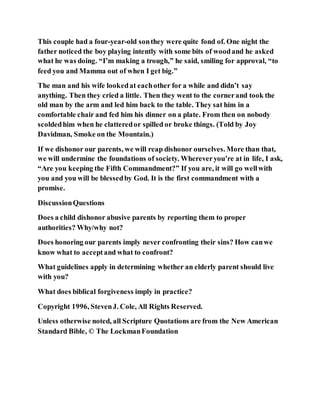
![Exodus 20:12, The Fifth Commandment
By Roy B. Blizzard
[12] Honor your father and your mother, that your days may be long upon the
land which the LORD your God is giving you.
Translation:
Honor your father and your mother to the end that your days may be long on
the earth that YHWH, your Elohim, gives to you.
Comments:
Notice that this is the only one of the Ten Commandments with a promise: if
you honor your father and mother, your days will be long upon the earth.
Perhaps one reasonwhy one’s days might not be long upon the earth if they
fail to honor their father and mother is because in the Mishnah, Order
Nezikin, Tractate Sanhedrin7:4, "the rebellious and the disobedient son is to
be stoned."
In Deuteronomy 21:18-21, it states that the stubborn and rebellious son will be
stoned to death and in Exodus 21:17, it states that the sonwho curses his
father or mother shall surely be put to death.
Judaism placed greatemphasis upon family; not only the parents’
responsibilities to children, but also the children’s responsibilities to the
parents. That responsibility continued throughout the lifetime of the parents.
It was the responsibility of the child to see that their parents were adequately
provided for in their lifetime and to ensure a decent burial at their death.
Jesus calls attentionto this very fact in Mark 7: 10-13, whenHe says, "Moses
said, ‘Honor your father and your mother’; and, ‘He who curses father or
mother, let him be put to death.’" Then Jesus continues (referring back to
Exodus 20:12 and 21:17)saying, "if a man says to his father or mother,
‘Whatever profit you might have receivedfrom me is Corban’" (that is, a gift](https://image.slidesharecdn.com/thefifthcommandment-190726222737/85/The-fifth-commandment-241-320.jpg)

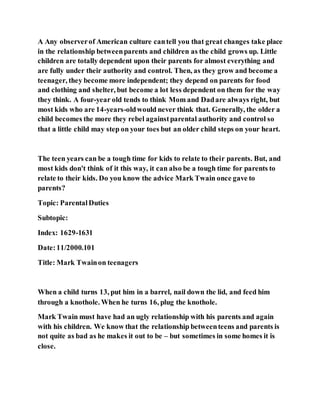









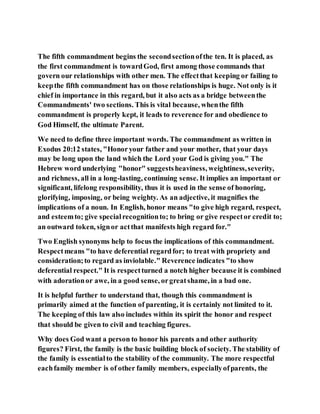


![suspicion, at the least, all the way to some being outright hostile, almost as if
keeping them were some kind of a curse. Yet, God Himself urges His children
to keepthem "that it may go well with [them]." He does not say that keeping
them will produce spiritual salvation, but that they will produce a pattern of
life that results in stability, safety, and enjoyment in personaland community
life.
This series on the Ten Commandments began with the statement that the
commandments seemto be arrangedin an order, beginning with the most
important. That is, they start with the one that, if broken, will inevitably lead
to breaking the others, resulting in chaos in a person's worship of God.
The first commandment presents God as the sovereignCreatorand Ruler of
His creation. He will not allow the worship and honor due to Him to be given
to others because it would only result in misdirection of life's purpose,
frustration, emotional and physical pain, and ultimately death to those who
worship any but Him. It therefore deals with what we worship. Mostof the
time, the "god" who gets betweenthe true God and us is the self. We are to
worship the Creator, the Author of a way of life that will produce right
relationships. This commandment demands that we make Him the source of
our values and practices.
The secondcommandment teaches that He wants no one to be concerned
about what He looks like. He has purposefully hidden this knowledge except
to tell us that we generally look like Him. However, we do not know specifics.
He has done this because physicalattributes can be misleading about
character. In our relationship with Him, He wants us to emphasize the
spiritual—His character, the qualities of His spiritual attributes, and His
purpose. The secondcommandment, then, involves the way we are to worship
Him—in spirit and in truth, always aware that man does not live by bread
alone.
The third commandment emphasizes the holy quality of His characterand
offices as identified by His names. His names revealwhat He is. It is the
Christian's responsibility to adorn and uphold the reputation and glory of all
that those names imply. When we were regenerated, His Family name—](https://image.slidesharecdn.com/thefifthcommandment-190726222737/85/The-fifth-commandment-256-320.jpg)












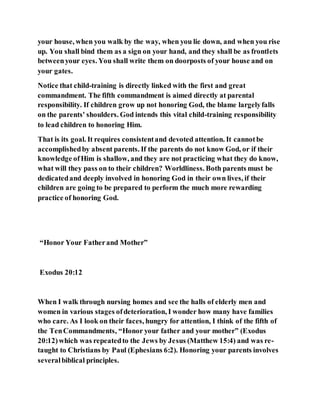





![[2] Inasmuch as these commandments were spokennot only for those who are
in the world, but also for those who are in heaven, therefore they could not be
perceivedin the same way by both - as for instance this commandment, that
they should honor father and mother in order that their days might be
prolonged upon the land which JehovahGod would give them; for in heaven
parents and children do not come togetherthe same as on earth; and
therefore for "father" there they have the Lord, and for "mother" His
kingdom. Nor canit be said of those in heaven that their days would be
prolonged, because they live there to eternity; nor can "land" be understood
there as in this commandment to mean the land of Canaan, but instead the
heavenly Canaanor heaven. As by "fatherand mother" are meant the Lord
and His kingdom, therefore this commandment is the fourth in order, and
surpasses in holiness those which follow. The commandment concerning the
worship of Jehovah, that is, the Lord, is first and second, becausethe most
holy one. Next comes the commandment concerning the Sabbath, because by
this in the supreme sense is signified the union of the Divine Itself and the
Divine Human in the Lord. After this follows the commandment concerning
honoring parents, because by this is signified the love of the Lord and the
consequentlove of goodand truth which are from the Lord. As these things
are signified by this commandment, therefore contempt for parents is
enumerated among the crimes which are signified by "shedding blood" (Ezek.
22:6, 7) and for this reasondisobedientand rebellious sons were stoned(Deut.
21:18-21).
AC 8900. Thatby "father" is meant the Lord, and by "mother" His kingdom,
has been shownjust above (n. 8897). But lest perchance the mind be in doubt
whether by "mother" in the internal sense is meant the kingdom of the Lord,
that is, heaven, I may add the following to what was saidabove. In the Word
by "mother" is meant the church (n. 289, 4257, 5581), whichalso on this
accountis at one time called"the bride," and at another "the wife," of the
Lord; and as the kingdom of the Lord is the same as the church, with only this
difference, that the kingdom of the Lord on the earth is called"the church,"
therefore this also is signified by "mother." Forthis reasonthe sons born of
this mother are truths, and are called"the sons of the kingdom" (Matt.
13:38); (n. 3373). Moreoverto all those who are therein the Lord‘s kingdom is](https://image.slidesharecdn.com/thefifthcommandment-190726222737/85/The-fifth-commandment-275-320.jpg)




















